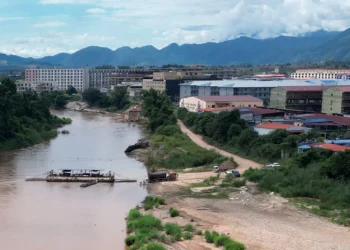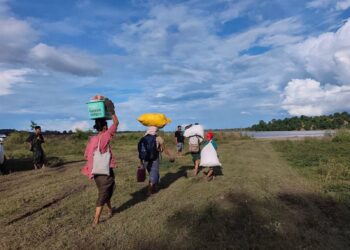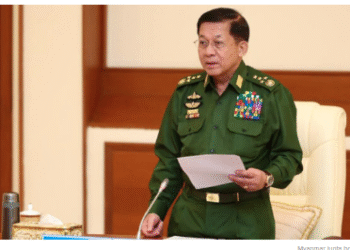Mandatory military service is not an uncommon practice around the world. In Myanmar, such a law was first introduced in 1959, but had never been enforced.
After a military-led coup in 2021, army chief Min Aung Hlaing hinted at conscription – an idea that didn’t take off until three years later, with an announcement on Feb 10, 2024.
What are the details of the conscription law?
All men between 18 and 35 years old and all women aged between 18 and 27 will have to serve up to two years in the military if called up.
There will be a higher age limit of 45 for men and 35 for women – and a longer three-year term of service – for some vocations such as doctors and engineers.
The length of service can be extended to five years during a state of emergency – a situation Myanmar has been in since the coup.
Junta spokesman Zaw Min Tun told media at least 13 million people will be eligible. The country’s population was reported at 55 million in 2021.
He said each recruitment batch would involve 5,000 conscripts, with the first intake in mid-April after Myanmar’s new year holiday known as Thingyan.
Young women will be recruited only from the fifth batch.
The aim is to recruit 60,000 soldiers in a year, to a military whose current total strength is thought to lie between 200,000 and 300,000.
Evading conscription will be punishable by up to five years in jail and a fine. Members of religious orders are exempt, while civil servants and students can be granted temporary deferments.
But on Wednesday (Feb 21), the decision to recruit women was seemingly scrapped, with Zaw Min Tun saying there were no plans yet in this area.
Why is Myanmar doing this now?
Three key factors led to this decision, said the Myanmar Institute for Peace and Security think-tank’s executive director Min Zaw Oo.
For a start, the Myanmar army has always had difficulty recruiting soldiers, a trend observed for decades now.
Added to that is the military being “overstretched” since its coup, with no reserve units that can be called up, Dr Min Zaw Oo added.
And then there was Operation 1027, a major offensive launched by ethnic rebel armies on Oct 27 last year. The large-scale, coordinated and prolonged attacks caught the junta by surprise, as many observers have pointed out.
“(The Myanmar army) is losing a lot of territories. And there are also other issues like drones, which have become a major threat to the military. Right now, what they need is to address the strength of the military,” said Dr Min Zaw Oo.
The opposition National Unity Government (NUG) said in August last year that it supplied at least 400 drones to rebel forces countrywide, to be used in launching attacks and dropping bombs on the military.
How are locals reacting?
The NUG has slammed the enlistment decree as “unlawful”, saying citizens are “not required to comply with it”.
In a statement, the NUG – which views the coup as illegal and the junta as having no legal authority – added that the move shows the junta has “suffered significant and humiliating defeats across the country”; is now “desperate”; and thus forcing civilians to fight and serve as “human shields” on the battlefield.
Htet Myat, a former Myanmar army captain who defected in June 2021, said he was not surprised by the enlistment law. “The Myanmar army had (in May last year) enacted gun laws, allowing its supporters to be armed … So I saw this coming.”
“When I first learned of this law, my view was that the army had conceded defeat,” he added. “The main aim of this law is for us to fight against one another.”
This, said Htet Myat, shows how determined army chief Min Aung Hlaing is to stay in power; as well as his will to win by any means.
He suggested that conscription could lead to corruption, with military officers taking the chance to accept bribes from wealthy families trying to buy their children’s way out.
A 32-year-old Myanmar citizen who only wanted to be identified by a pseudonym, Myat, told CNA the same.
“My first instinct about this new enlistment law was, it’s a chance for the military to make money,” he said. “Even active servicemen who don’t want to go to the frontline bribe their way out of it.”
Myat added: “I’m just three years away from being 35 and I’m on track to get on board a ship to work as a seaman. I’m afraid I may be stopped because I’m still eligible to serve. I’m definitely thinking about bribing someone to allow me to get onboard the merchant vessel.”
Experts said that many youths in Myanmar are worried and already making plans to leave the country.
“Middle-class families have been selling their properties so that they can send their kids abroad and evade this conscription law,” Dr Min Zaw Oo said.
He expects a further uptick in capital flight – mass movement of funds and assets – across borders.
“Myanmar has become one of the largest groups of new condominium owners in Thailand because many citizens are fleeing Myanmar,” he said, adding that more people might follow suit now after the new law.
What are other implications?
One serious – and predictable – consequence is an uptick in violence.
“Recruitment means there’s going to be more fighting,” Dr Min Zaw Oo said. “The military will launch counter-offensives. So this means there will be enormous violence coming – much more violence than what we had been seeing in the last few months.”
He also noted the possible effects of civilian conscripts psychologically transforming into soldiers.
“In the battlefield, a lot of people care about two things. One – they don’t want to get shot by the other side. Two, they care about people beside them,” said Dr Min Zaw Oo.
“People fight for the people around them. This is how the military training builds up comradeship. The unity spirit … You no longer think about ideology.”
But he added it was still too early to tell if the Myanmar military was capable of changing hearts and minds.
Neither does he think the enlistment law will inspire youths to instead join resistance armies like the NUG’s People Defence Force.
“A lot of people who remain in the country don’t want to physically get involved in the fighting … Whichever side you’re on, there’s a risk of getting killed,” said Dr Min Zaw Oo.
“Even though they may be politically supportive of the opposition, many still have to think twice before deciding to fight.
“For many, the first option is to leave the country.”
Will ASEAN do anything?
Myanmar’s enforcement of an enlistment law is a domestic affair. So from a legal standpoint, the Association of Southeast Asian Nations (ASEAN) will find it hard to pressure the junta solely based on this decision, since such laws exist in many countries.
But there are potential trigger points for the regional bloc to step in, said Dr Min Zaw Oo. One, if the recruitment exercise turns into a disaster; and two, if the violence ramps up to an unprecedented scale.
“There could be more refugee flows going into neighbouring countries, and more border instability and human rights abuses, and more civilian killings. That would then be an international concern,” he said.
In the meantime, ASEAN’s best bet is to stick to the Five-Point Consensus, a peace plan agreed upon in April 2021 by leaders of nine member states and junta chief Min Aung Hlaing.
That will be the main way for it to keep pushing the regime in Myanmar to end violence, said Dr Min Zaw Oo.
Source: CNA






